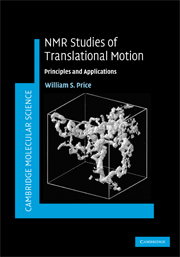Book contents
- Frontmatter
- Contents
- Preface
- Acknowledgements
- Abbreviations
- 1 Diffusion and its measurement
- 2 Theory of NMR diffusion and flow measurements
- 3 PGSE measurements in simple porous systems
- 4 PGSE measurements in complex and exchanging systems
- 5 PGSE hardware
- 6 Setup and analysis of PGSE experiments
- 7 PGSE hardware and sample problems
- 8 Specialised PGSE and related techniques
- 9 NMR imaging studies of translational motion
- 10 B1 gradient methods
- 11 Applications
- Appendix
- Index
- References
7 - PGSE hardware and sample problems
Published online by Cambridge University Press: 06 August 2010
- Frontmatter
- Contents
- Preface
- Acknowledgements
- Abbreviations
- 1 Diffusion and its measurement
- 2 Theory of NMR diffusion and flow measurements
- 3 PGSE measurements in simple porous systems
- 4 PGSE measurements in complex and exchanging systems
- 5 PGSE hardware
- 6 Setup and analysis of PGSE experiments
- 7 PGSE hardware and sample problems
- 8 Specialised PGSE and related techniques
- 9 NMR imaging studies of translational motion
- 10 B1 gradient methods
- 11 Applications
- Appendix
- Index
- References
Summary
Introduction
There are a number of potential problems that must be addressed in PGSE measurements if high quality data is to be obtained. The problems include: (i) rf interference, (ii) radiation damping and long-range dipolar interactions, (iii) convection, (iv) homogeneity of the applied magnetic field gradient, (v) background magnetic gradients, (vi) eddy currents and static magnetic field disturbances generated by the gradient pulses, and lastly (vii) gradient pulse mismatch and sample movement. Almost invariably these problems lead to increased signal attenuation and thus overestimates of the diffusion coefficient and misinterpretation of the experimental data, and it has been noted that all PGSE systems have thresholds below which artefactual attenuation exceeds diffusive attenuation. Here, we consider the origins of these problems, their symptoms and some methods to alleviate them.
RF problems
The addition of gradient coils to an NMR probe can have deleterious effects on probe performance. Due to the proximity of the gradient coils to the sample region, the gradient coils and leads can, without appropriate precautions, act as antennae and introduce rf interference. A related problem is the possible strong mutual inductance between the gradient and the rf coils. Thus, the quality factor Q (= ωL/R where ω, L and R are the resonance frequency, inductance and resistance, respectively) of the rf coil(s) are diminished resulting in longer pulses for the same flip angle, poorer decoupling efficiency and S/N.
The effects of non-ideal B1 pulses and B1 inhomogeneity are well-known on spin-echoes, but have not been widely considered with respect to NMR diffusion measurements.
- Type
- Chapter
- Information
- NMR Studies of Translational MotionPrinciples and Applications, pp. 221 - 255Publisher: Cambridge University PressPrint publication year: 2009

